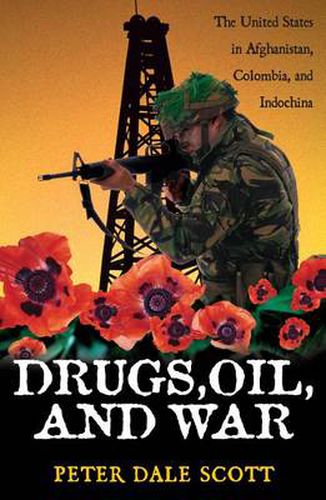Readings Newsletter
Become a Readings Member to make your shopping experience even easier.
Sign in or sign up for free!
You’re not far away from qualifying for FREE standard shipping within Australia
You’ve qualified for FREE standard shipping within Australia
The cart is loading…






Peter Dale Scott’s work illuminates the underlying forces that drive US global policy from Vietnam to Colombia and now to Afghanistan and Iraq. He brings to light the intertwined patterns of drugs, oil politics and intelligence networks that have been so central to the larger workings of US intervention and escalation in Third World countries through alliances with drug-trafficking proxies. This strategy was originally developed in the late 1940s to contain communist China. It has since been used to secure control over foreign petroleum resources. The result has been a staggering increase in the global drug traffic and the mafias associated with it, a problem that will worsen until there is a change in policy. Scott argues that covert operations almost always outlast the specific purpose for which they were designed. Instead, they grow and become part of a hostile constellation of forces. The author terms this phenomenon parapolitics, the exercise of power by covert means, which tends to metastasize into deep politics - the interplay of unacknowledged forces that spin out of the control of the original policy initiators. We must recognize that US influence is grounded no just in military and economic superiority, Scott contents, but also in so-called soft power. We need a soft politics of persuasion and nonviolence especially as America faces the prospect of yet another disastrous intervention, this time in Iraq.
$9.00 standard shipping within Australia
FREE standard shipping within Australia for orders over $100.00
Express & International shipping calculated at checkout
Peter Dale Scott’s work illuminates the underlying forces that drive US global policy from Vietnam to Colombia and now to Afghanistan and Iraq. He brings to light the intertwined patterns of drugs, oil politics and intelligence networks that have been so central to the larger workings of US intervention and escalation in Third World countries through alliances with drug-trafficking proxies. This strategy was originally developed in the late 1940s to contain communist China. It has since been used to secure control over foreign petroleum resources. The result has been a staggering increase in the global drug traffic and the mafias associated with it, a problem that will worsen until there is a change in policy. Scott argues that covert operations almost always outlast the specific purpose for which they were designed. Instead, they grow and become part of a hostile constellation of forces. The author terms this phenomenon parapolitics, the exercise of power by covert means, which tends to metastasize into deep politics - the interplay of unacknowledged forces that spin out of the control of the original policy initiators. We must recognize that US influence is grounded no just in military and economic superiority, Scott contents, but also in so-called soft power. We need a soft politics of persuasion and nonviolence especially as America faces the prospect of yet another disastrous intervention, this time in Iraq.